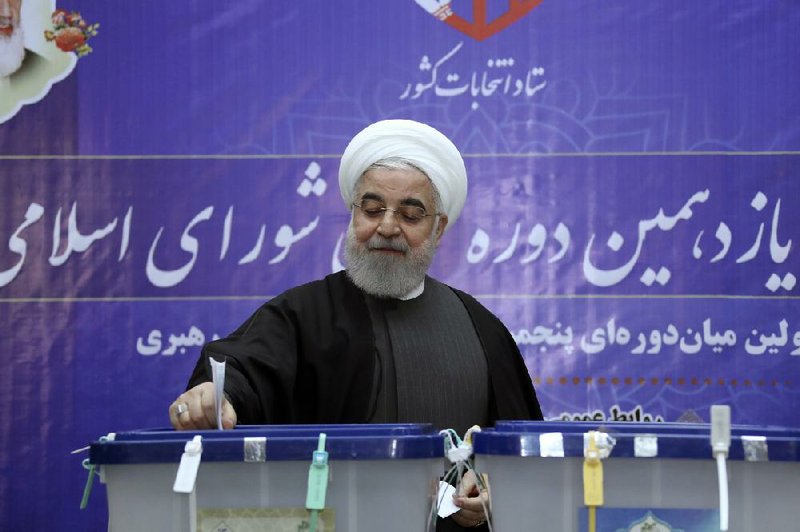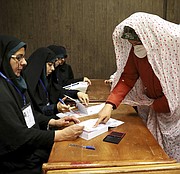TEHRAN, Iran -- Iranians voted for a new parliament Friday, with turnout seen as a key measure of support for Iran's leadership as sanctions weigh on the economy and U.S. pressure isolates the country diplomatically.
The disqualification of more than 7,000 potential candidates, most of them reformists and moderates, raised the possibility of lower-than-usual turnout. Among those disqualified were 90 sitting members of parliament who had wanted to run for reelection.
Initial results were expected to be announced today. Presidential elections are expected to take place in 2021.
The election comes at a time of growing economic hardship for many in Iran. U.S. sanctions have hindered Iran's ability to sell its oil abroad, forcing its economy into recession.
[Video not showing up above? Click here to watch » https://www.youtube.com/watch?v=eV4NLMnoQCo]
Also looming over the election is the threat of covid-19. Many voters headed to the polls with face masks on.
Iranian health authorities on Friday confirmed two new deaths from the virus, which first emerged in China in December, bringing the total death toll in Iran to four, from among 18 confirmed cases. Authorities say all the cases have links with the city of Qom, where the first two elderly patients died on Wednesday. Concerns over the spread of the virus prompted authorities in Iran to close all schools, universities and Shiite seminaries in Qom.
Iran's leadership and state media have urged people to show up and vote, with some framing it as a religious duty. Supreme Leader Ayatollah Ali Khamenei cast his ballot at a mosque near his Tehran office, shortly after polls opened.
"Anyone who cares about Iran's national interests should participate in the election," he said. Earlier in the week, Khamenei said high voter turnout will thwart "plots and plans" by the U.S. and supporters of Israel against Iran.
After the disqualifications, around 7,000 candidates were left vying for a place in the 290-seat chamber across 208 constituencies.
Iranian President Hassan Rouhani, who had initially criticized the disqualification of so many moderate would-be candidates, cast his ballot on Friday and urged the public to stage another "victory" by voting in large numbers. "Our enemies will be disappointed more than before," he said.
On the eve of the vote, the Trump administration ratcheted up its campaign of pressure on Iran by imposing sanctions on two senior officials of the Guardian Council, the body of clerics and judges that decides which candidates may run in elections. The U.S. also sanctioned three members of Iran's elections-supervisory committee, saying that all those targeted were responsible for silencing the voice of the Iranian people by rejecting thousands of people from running.
Secretary of State Mike Pompeo criticized the election as a "sham" and a vote that "is not free or fair."
Iran's Foreign Minister Mohammad Javad Zarif was quoted in official media saying the election showcases that Iranians are choosing their own fate and "do not allow a person sitting in Washington to make decisions for them."
Ali Motahari, one of the pro-reform lawmakers who were barred from defending their seats in this election, said the incoming parliament will not be truly representative of the people. Still, he urged people to vote.
"We should still try to find moderate and clear-headed candidates from the existing ones and vote for them," he said.
The parliament in Iran does not have power to dictate major policies, but it does debate the annual budget and the possible impeachment of ministers. Power in Iran ultimately rests with Khamenei, who has final say on all key matters.
Information for this article was contributed by Aya Batrawy of The Associated Press.
A Section on 02/22/2020

